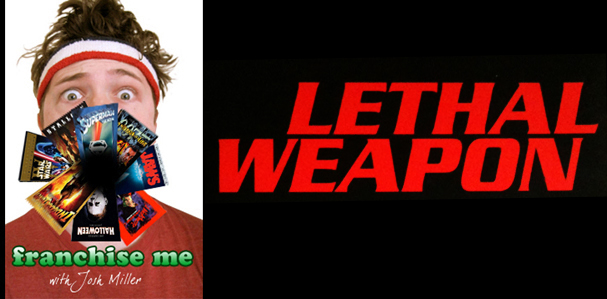
Hollywood loves a good franchise. The movie-going public does too. Horror, action, comedy, sci-fi, western, no genre is safe. And any film, no matter how seemingly stand-alone, conclusive, or inappropriate to sequel, could generate an expansive franchise. They are legion. We are surrounded. But a champion has risen from the rabble to defend us. Me. I have donned my sweats and taken up cinema’s gauntlet. Don’t try this at home. I am a professional.
Let’s be buddies on the Facebookz!
The Franchise: Lethal Weapon — following the personal and professional lives of aging and put-upon Los Angeles homicide detective Roger Murtaugh and his loose-cannon partner Martin Riggs. The franchise comprises four feature films, from 1987-1998.
previous installments
Lethal Weapon
Lethal Weapon 2
Lethal Weapon 3
The Installment: Lethal Weapon 4 (1998)
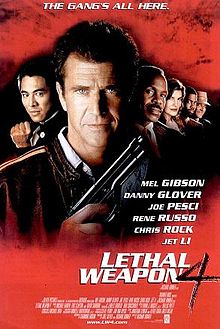
The Story:
The film opens with just another random day on the job for Riggs and Murtaugh as Los Angeles homicide detectives: fighting a man covered in head-to-toe sheet metal armor who is shooting a machine gun with one hand and a flamer thrower with the other. During this routine battle, Riggs learns that he is going to be a father. And Murtaugh learns that he is going to be a grandfather. Riggs doesn’t know if he wants to marry his babymama, Cole. And Murtaugh doesn’t even know who his daughter’s babypapa is. Murtaugh’s family situation is made even messier when he secretly adopts a family of Chinese illegal immigrants that he discovers at a crime scene involving a Chinese slave ship. Little does he know that this Chinese family was intended to be used as ransom by a high-ranking Triad gangster named Wah Sing Ku (Jet Li) as part of a money forgery scheme. So Riggs, Murtaugh, and newcomer Det. Lee Butters (Chris Rock) must sort some shit out. Oh yeah, and Butters is the babypapa of Murtaugh’s unborn grandchild, but Murtaugh doesn’t know, but Riggs does. And now Leo is a private investigator, which has opened up a whole new world of things that he feels they “fuck you” at. Car chases and marital arts battles ensue. Then everyone gets babies at the end! Aww.
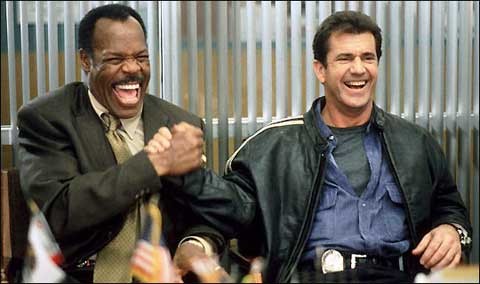
What Works:
It is peculiar that Lethal Weapon 4 has a reputation for being a colossal mess. Don’t get me wrong, it is a colossal mess, but it isn’t really any more of a mess than the beloved LW2. And it certainly isn’t as huge a step down in quality as popular opinion seems to hold. If anything, LW4 shines a light back on the franchise, highlighting how slapdash things have always been — the franchise didn’t suddenly become terrible with this installment, it was a slow death of a thousand cuts. LW4 was simply the breaking point for audiences, it seems. To the film’s credit, it still had its head in the right place with some things…
Looking back at these four films one thing glows with clarity: the casting of the villain is extremely important. Jet Li is an inspired choice on two levels. One, Li has presence; he’s a movie star in China for a reason. Two, Li offers something completely new as a villain, which is something the franchise desperately needed after LW3‘s downgraded foe Jack Travis. Mr. Joshua may have been able to trade blows with Riggs, but at the end of the day Lethal Weapon is a shoot ’em up franchise. Riggs and Murtaugh are great at shooting people. In one of LW4‘s better moments, Riggs and Murtaugh get the drop of Li’s Ku, book-casing him between their readied handguns. Then Ku dismantles Riggs’ gun with a single deft motion. For Riggs, a character who confessed that his only true talent is shooting people, this is the ultimate castration move — one that plays into the climax of the film, when Riggs and Murtaugh have the chance to walk away from Ku but decide to foolishly fist-fight him under the sarcastic guise of Riggs wanting to ask him how he dismantled Riggs’ gun. Similar to Arjen Rudd, Ku isn’t much of a character on the page. But Li’s over-serious intensity keeps the character alive in our minds. And in an archetypal sense, his mostly silence performance plays dynamically against Riggs and Murtaugh’s chatty nature. Also, in 1998, The Matrix was still one year away. The broader American audience was at least casually familiar with people like Bruce Lee, Chuck Norris, Steven Seagal, Jean Claude Van Damme, so martial arts wasn’t exactly exotic anymore, but it wasn’t exactly something one saw in a big mainstream action film either — unless it was James Bond rather unconvincingly trading karate chops with a henchman. Elaborately choreographed martial arts was largely still niche. Jackie Chan had just wowed many people for the first time with the American cut of Rumble in the Bronx. People were poised, and watching Jet Li beat the ever-loving shit out of Gibson and Glover is a lot of fun. The rain soaked final showdown between the three characters is easily the best hand-to-hand fight in the franchise. It is also a novelty to see Riggs and Murtaugh fighting someone together.
On an absurdity level, the action scene in which Murtaugh’s boat is sunk by the Chinese ship smuggling immigrants is fun, even though it delves into children’s cinema territory when Leo is menaced by the shark the men had just caught fishing. Like LW3, this film’s best action set-piece is a multi-part chase. I love the highway portion of this sequence where Riggs is fighting with a goon inside a house on a flatbed truck, while Murtaugh follows along side in a car. The schtick where half the house is protected only in plastic wrap is genius, so Riggs can repeatedly be thrown and pressed against it and we know that eventually that plastic has to tear and someone is going to go flying onto the highway.
Though much of it gets cramped or sullied amidst this over-stuffed film, the filmmakers do pay reasonable attention to the natural evolution of Riggs and Murtaugh’s lives. Time feels like a factor here, in a way movie series often don’t address unless it is being used as a ‘we’re back!’ gimmick, à la Indiana Jones 4. Murtaugh turned 50 in the first film, but rather than continue to beat this into the ground LW4 turns the tables to Riggs (this is also a wise move considering that Murtaugh is now an improbable 61-years-old, which makes the fact that he isn’t talking about retirement anymore a bit fantastical). Giving Riggs the “I’m too old for this shit” moment, and having Murtaugh finally for once be in the position to mock/tease Riggs feels like a full-circle move. Frankly the movie could have used more of it. And the presence of children is generally a sign of franchise death, but in this case – with the babies still being unborn – it fits. Murtaugh’s oldest daughter Rianne, and her sexuality, has always played a comic-nuisance role in the Murtaugh subplots. So making her both pregnant and secretly married is a fun choice to fluster Murtaugh, which is presumably the emotional state fans want to see him in.
I plan to address the dead ex-Mrs. Riggs more in the Franchise Assessment, but LW4 made a move to undo some of the awfulness that transpired in LW2. In 2 Riggs has a conversation with Mrs. Murtaugh about his dead wife that feels strangely emotionless and out of no where (of course, later in the film we realize this conversation existed solely for the unacceptably asinine reveal that the South Africans had been responsible for her death). In LW4 there is essentially a repeat of this same scene. Now though there is context. With Lorna Cole pregnant with Riggs’ baby, the question of marriage naturally arises, and finally since the first film we get something akin to genuine humanization of Riggs. As opposed to blandly giving Mrs. Murtaugh an anecdote about his wife’s death, now they are having a real conversation, with Riggs confessing that part of him still feels married. “It’s not finished.” It isn’t much of an arc, but we can now trace full progress for Riggs up through the moment he and Cole get married in the hospital while she lies on a gurney trying to hold her baby in until they can say their vows — a cute scene that is, like many elements of the franchise, now made a little awkward by Mel Gibson’s public life. When Leo, desperate to find anyone who can perform the marriage, returns with a rabbi, Riggs’ big response of “A rabbi?!” takes on a different color.
Since we need to accept that any franchise four films into its series is existing entirely for those who love its characters and conventions, LW4 works in a ‘series finale’ sort of way, tossing it all the classic bits and old characters for one last hurrah. Mary Ellen Trainor, as police psychologist Dr. Woods, gets her funniest scene of the franchise. Riggs pays to have his trailer home expanded into a house, wacka wacka. Riggs and Murtaugh get promoted to Captain, then get pointlessly demoted again at the end for no real reason other than to say “Look guys, nothing will ever change! Riggs and Murtaugh will always be sergeants and Murtaugh will never retire!” In fact, the entire ending sequence is littered with fan-service. Leo only gets partially through another “they fuck you at the ____” because the bit itself is now a bit. And the movie even ends with a group photo of all our primary characters, who extoll to the doctor snapping their picture that they aren’t friends, they’re “family.” Of course, Riggs and Murtaugh give each other a look when the doctor says he will take the picture “on the count of three.” All we needed was a jazz hands freeze frame.
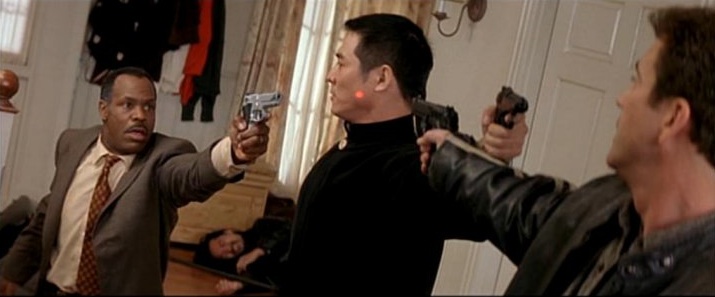
What Doesn’t Work:
This has nothing to do with the film itself, but what the fuck is up with that poster? I realize that in 1998 Mel Gibson was more famous than Danny Glover, but this is their franchise. He gets the same sized floating head as Jet Li? I hope Glover punched his agent.
I no longer remember what the rumors were regarding LW4 back when it was new, but it doesn’t matter. I know enough about making movies to know that LW4 started shooting without a finalized script. On a scene-by-scene basis the film is just fine, but there is just way too much going on in this movie for any of it to feel appropriately important. And starting about midway through, the filmmakers are put into a near constant state of having to explain and conclude all the subplots it needlessly tossed into the movie — like the goes-no-where thread where Riggs thinks Murtaugh might be on the take but it turns out that Mrs. Murtaugh has been moonlighting as a popular romance novelist named Ebony Clark. This isn’t that bad on its own, but it is symptomatic of the larger mess.
For one thing, our bad guys have multiple goals. Uncle Benny (Kim Chan), our “false villain” as I’d call him, runs a slave labor ring using Chinese immigrants. Ku is using Uncle Benny to import Hong (Eddy Ko) and his family to bribe Hong’s relative that Ku is holding prisoner and forcing to make counterfeit money. Ku plans to use this counterfeit money to pay off a corrupt Chinese general so that he will free four Triad (Chinese mafia) members, one of whom is Ku’s brother. Now, written out succinctly like that, that doesn’t see too confusing, but it is all wrong for this franchise for two pretty basic reasons: 1) Look at the villains in the first three films. They had extremely simple, often verging on unclear goals. This is how the franchise has evolved, because the “mystery” involving the antagonists doesn’t actually matter. We just want to see Riggs and Murtaugh put through some funny/exciting obstacles. With the sheer number of characters and other bullshit happening in LW4 we don’t have time to deal with all this nonsense. And more importantly, 2) that whole no finalized script thing. When we have to sit through poor Danny Glover delivering some ‘detective’ logic-leap-exposition explaining this shit, you will pine for those South Africans, cradling and apologizing to your LW2 DVD for complaining about Arjen Rudd’s totally undefined evil-doery.
Speaking of Hong and his family, who Murtaugh finds in a dingy next to the Chinese slave ship and decides to illegally smuggle into his home for protection. Nothing in LW4 represents the conceptually gorged problems we have here better than Hong and his clan. Like almost all of the film’s woes, on paper this sounds like a perfectly decent subplot for Murtaugh, especially because it ties into the villains. But the execution is awful, and there just isn’t time for any of it. Why does Murtaugh do it? Well, he tells Riggs, “I’m freeing slaves.” Ugh. And then he backs up that heinous line with, “This is my chance to do something, and do it right.” What the hell does that mean? You’re a cop! Not even just a cop. A fucking super cop responsible for – if this were the real world – three of the craziest most important criminal take-downs in American history. Beyond that, Murtaugh isn’t the fuck up. Riggs is. The Murtaugh family is known for lovingly taking in strays, but this subplot plays it cheap, eventually dumping all the characters once the plot doesn’t need them anymore. Murtaugh gives Hong the watch that Murtaugh’s father had given him; an important family heirloom. Then just mere scenes later, Hong is dead and Murtaugh reclaims the watch from the corpse. None of this means anything, and these two scenes feel like plot-beats from a previous draft of LW4 in which Hong served a greater purpose. Also, the stupid logic that Murtaugh is doing this out of some abstract minority slavery solidarity is undercut by the casual racism with which Riggs and Murtaugh treat the Chinese villains, constantly making fun of their accents and names.
You know, I honestly thought I’d be skipping Leo here, leaving things with just a: “Leo is still unnecessary.” But LW4 managed to replenish my bile. It is never a good sign when a franchise latches onto something that wasn’t even an element to begin with. In this case it is Leo’s job, or rather that he keeps switching jobs. He did indeed switch occupations from LW2 to LW3 but that’s because his career used to be money laundering. That wasn’t a personality trait. Once turning legit, Leo became a real estate agent. Now he’s a private detective? Presumably he would have had yet another job in LW5 if they had made it. I feel like the filmmakers don’t even understand their own character, which is extra irksome considering how superfluous Leo is in the first place. To some extent I blame this shitty trajectory on the deletion of a great little scene from LW2 that was omitted from the theatrical cut, but exists in the extended version. In the scene Leo regales Riggs and Murtaugh with an explanation of how he remembered a suspect’s address in a very OCD manner. Leo used to be a nerd. By LW4 he kind of seems like an idiot. LW4 takes Leo from LW3 – which was already a lousy use of the character – and runs with that ball instead of LW2‘s original version of the character. Why not keep him a real estate agent? What if he was now rich? Why use the character for detective duty, something Riggs and Murtaugh are fully capable off? Why not have Riggs and Murtaugh need Leo’s nerdier expertise on something? Or why not just have Leo join the police force or some stupid shit? Worse than all this though, is the fact that LW4 acknowledges how terribly Riggs and Murtaugh treat Leo. After once again spending most of the film with Riggs and Murtaugh bullying poor tiny Leo for zero reason – Riggs actually destroys Leo’s new handgun, saying “You don’t deserve this.” – Leo ends up giving Riggs a poorly written but touchingly performed speech at the ex-Mrs. Riggs’ grave. The speech is about how Riggs and Murtaugh are the only friends Leo ever had. The fact that a great actor like Pesci delivers his speech with total plausibility transforms Leo from an already uncomfortably mistreated character to a truly depressing one. Making things even worse is the fact that this comes in the context of Leo helping Riggs, not the other way around. A more emotionally rewarding moment would have been if finally Riggs and Murtaugh had done something really kind to Leo. The best he gets is that they ask him to pose in their big family picture at the end. Aww?
Chris Rock is not a good actor. He functions suitably enough here playing Chris Rock, but this is in fact my exact problem with his presence in the film. Kudos to Joel Silver and company for deciding to get trendy in their casting, using Jet Li and Rock, who had just blown up in a big way with his HBO special Bring the Pain. Using a stand-up to riff on a version of their stage persona can work very well – Eddie Murphy in 48 Hrs, or George Carlin in Car Wash – but it sure doesn’t here. In fact, it is downright embarrassing watching Rock’s Det. Lee Butters go off on several angry Rock-esque rants. It is tiresome enough to get Leo’s “they fuck you” rants, but at least those sound like rants, not carefully worded stand-up routines. Butters is an otherwise good character too. Possibly if Rock was a better actor things might have worked, but his weak abilities when combined with the messy nature of the film make his rants distracting, almost akin to if Bon Jovi had been cast in the film and every so often we had to stop and listen to him play a song for 45 seconds. I can’t condemn the filmmakers for thinking implanting Chris Rock might work, so I’ll chalk this up to more of a well-meaning misfire.
Riggs needs his mullet back. I realize they weren’t in anymore in 1998, but Rigg’s hair was akin to Indiana Jones hat. I’m only half joking here.
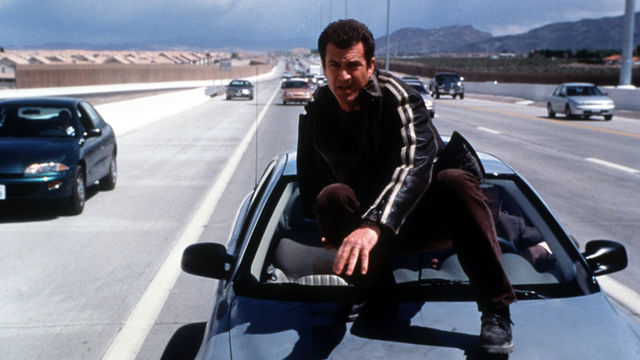
Body Count: 30
Best Kill: The goon Riggs kills using his new laser-site to ricochet a bullet like a pool ball off objects in the room to hit his otherwise protected target.
Best Line: Upon learning that his daughter is pregnant by some mystery man.
Murtaugh: Please let him be black.
Corniest Line:
Riggs: What I wouldn’t give for a siren right now!
Murtaugh: [sticks his head out the car window and makes a siren sound with mouth]
Worst Line: Cole: Nothing comes between a pregnant lady and a meal.
Riggs Worst Cop Moment: Destroying property at Uncle Benny’s entirely legit restaurant, when they didn’t even have a warrant to be messing around there in the first place.
How Often Riggs/Murtaugh Is Too Old For This Shit: 2
Richard Donner’s Political Propaganda: 1) American immigration laws, in the form of a Chris Rock stand-up routine. 2) Gun laws, when Riggs says that the armored maniac from the film’s prologue might be a “spokesman for the NRA.”
Should There Be a Sequel: No. I think we’re just about done here.
Franchise Assessment:
Lethal Weapon‘s charm comes from how old-fashioned it is. Structurally, as a franchise, it harkens back to the days before television and home video when sequels were the only way to revisit beloved characters. And Lethal Weapon feels a lot like a TV show, for better and for worse — tonally, I would say, mostly for worse.
Lethal Weapon is not a great franchise, at least proportional to its box office and lasting fame. But also because I think it fails on its own terms, which is weird for a franchise like this. Usually a film series goes astray when all the original talent jumps ship or budgets get slashed, when it becomes clear that sequels are being generated by bean-counters not creative forces. This is a franchise that could always do whatever it wanted, and was never encumbered by needing to jump through hoops to explain why a sequel is occurring. The films should have gotten better or at least have had one really excellent sequel. The problem I place symbolically on the grave of Mrs. Riggs. She was the dark spring board for the entire franchise, providing the motivation for Riggs’ death wish that was Shane Black’s hook for the first film. But Mrs. Riggs immediately became an element that the franchise did not know what to do with, because audiences responded not to Riggs’ death wish but to the action and the wacky rapport of Gibson and Glover. LW2 cheaply used Mrs. Riggs’ memory, and LW3 mostly ignored her. To put it simply, Riggs sticking a gun in his mouth became the elephant in the room.
In a way the Lethal Weapon sequels remind me of the Rambo TV cartoon — they’re re-purposing our heroes, emphasizing their appealing traits without the darker context that motivated those traits in the first place. On a broader level, this isn’t necessarily a bad move. We like Riggs, so would we really want a franchise in which he still kept his prized suicide bullet in his pocket? No, the problem here is the jettisoning of the context. People loved crazy Riggs doing insane things, giving Gibson an excuse to do his ‘crazy eyes.’ But Riggs acted like that because he wanted to die, because he just didn’t give a shit anymore. Keeping his craziness, minus the death wish, just made him a bad cop, which is a whole the franchise kept digging deeper and deeper with each sequel. Mel Gibson and Danny Glover make Riggs and Murtaugh likable. But on paper they are awful, awful heroes. They find being cops inconvenient to their goals, which generally involves shooting tons of people. Wrapping these characters up in smiles and banter and what is basically a PG tone underneath all the swearing and violence feels almost creepy in a way. It also feels like a disservice to what were two excellent characters at the beginning.
Franchise ranked from best to worst:
An orderly law of diminishing returns if I ever saw one…
Lethal Weapon
Lethal Weapon 2
Lethal Weapon 3
Lethal Weapon 4
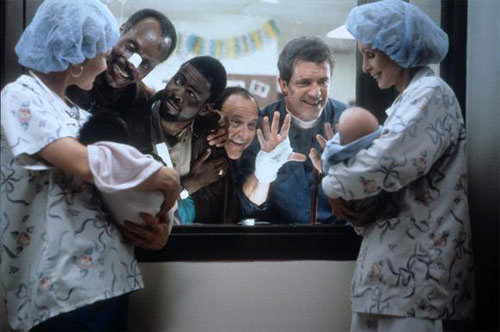
Up Next: Meatballs. I feel like doing a comedy before jumping into Alien.
DISCUSS THE FRANCHISE ON THE BOARDS
previous franchises battled
Critters
Death Wish
Hellraiser
Home Alone
Jurassic Park
Leprechaun
The Muppets
Phantasm
Planet of the Apes
Police Academy
Psycho
Rambo
Tremors